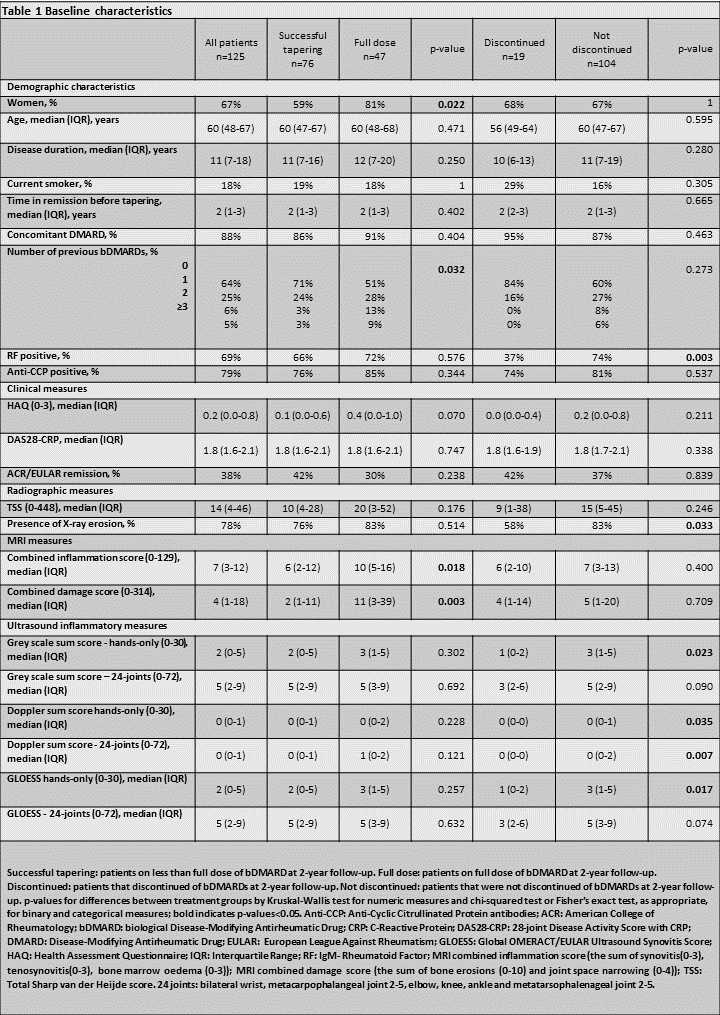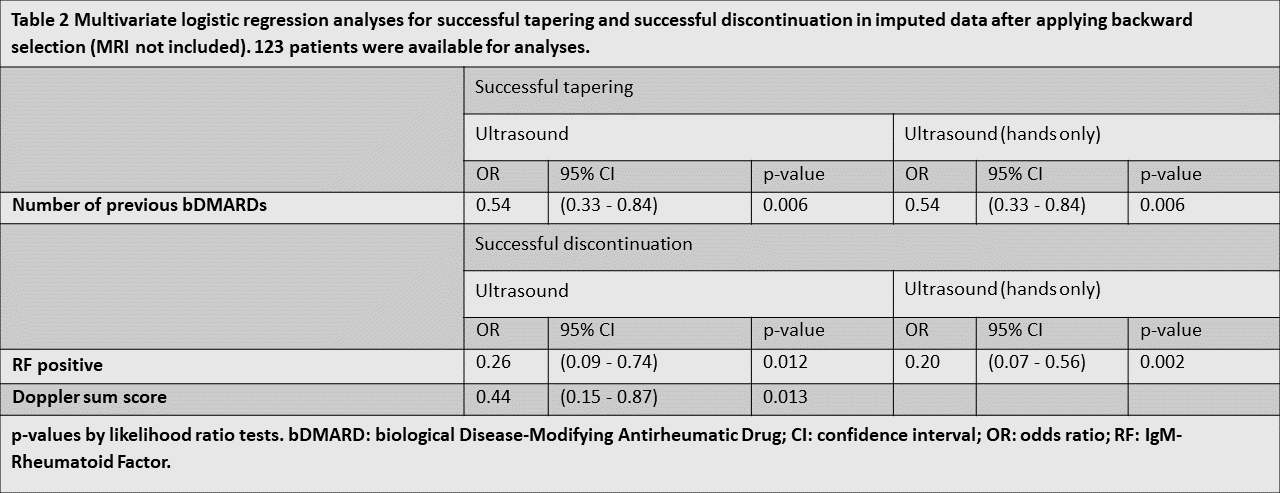Session Information
Session Type: Poster Session D
Session Time: 9:00AM-11:00AM
Background/Purpose: There is an increasing interest in tapering or even discontinuing biological disease-modifying anti-rheumatic drugs (bDMARDs) in rheumatoid arthritis (RA) patients in sustained remission. The aim was to assess the potential role of ultrasound (US) for predicting successful tapering and successful discontinuation.
Methods: Patients with RA on bDMARDs in sustained disease activity score remission (DAS28-CRP < 2.6) and no radiographic progression the previous year were included(1). At baseline, clinical assessment, MRI and x-ray were performed as part of a standardized tapering regimen. Further, synovitis in 24 joints was scored 0-3 by US using the OMERACT scoring system for synovitis. At patient level, greyscale (GS), Doppler and the Global OMERACT/EULAR US Synovitis Score GLOESS synovitis sum scores were calculated. The bDMARD was reduced to 2/3 of standard dose at baseline, ½ dose after 16 weeks, and discontinued after 32 weeks. If flare occurred (defined as either DAS28-CRP≥2.6 and ΔDAS28-CRP≥1.2 from baseline, or erosive progression on X-ray and/or MRI) tapering was stopped and the dose escalated to the previous level. Final state of treatment was assessed after 2-years.
Logistic regression analyses were used to identify factors associated with successful tapering and successful discontinuation at 2 years follow-up. For all models, variables shown in Table 1 except MRI were included (separate models for ultrasound “24-joint-score” and “hands-only score”). Additional analyses including MRI variables (combined inflammation and combined damage) were performed. Missing data in independent variables were imputed with multiple imputation by chained equations (50 imputed datasets). Variables with p< 0.25 in univariate analyses were included in the initial multivariate model. Backward selection was performed to derive the final multivariate models using a significance level of 0.05.
Results: One-hundred-and-twenty-five patients completed 2-year follow-up. At 2 years, 47 patients (38%) were back on full dose, 59 (46%) tapered to 2/3 or ½ dose and, 19 (15%) had discontinued the bDMARD. A lower number of previous bDMARDs was an independent predictor for successful tapering (OR=0.54; p=0.006) (table 2). Negative IgM-RF (OR=0.26; p=0.012) and low Doppler sum score for 24 joints (OR=0.44; p=0.013) but not for hands alone, predicted successful discontinuation. Including MRI variables in the model did not affect the predictive value of Doppler sum score. GLOESS sum score was unable to predict successful tapering or discontinuation.
Conclusion: A low Doppler 24-joint sum score and negative IgM-RF at baseline were independent predictors for successful discontinuation of bDMARDs at 2-years’ follow-up. Low number of previous bDMARD, but not baseline US, predicted successful tapering.
Ref: 1. Brahe CH et al. Rheumatology (Oxford).2019;58:110-119.
To cite this abstract in AMA style:
Terslev L, Hegaard Brahe C, Hetland M, Georgiadis S, Ellegaard K, Juul L, Døhn U, Fana V, Møller T, Krabbe S, Ørnbjerg L, Glinatsi D, Khai Huynh T, Manilo N, Jensen D, Asmussen K, Boesen M, Rastiemadabadi Z, Morsel-Carlsen L, Møller J, Røgind H, Hansen A, Nørregaard J, Jacobsen S, Krogh N, Østergaard M. Doppler Ultrasound Predicts Successful Discontinuation of Biological DMARDs in Rheumatoid Arthritis Patients in Sustained Clinical Remission [abstract]. Arthritis Rheumatol. 2020; 72 (suppl 10). https://acrabstracts.org/abstract/doppler-ultrasound-predicts-successful-discontinuation-of-biological-dmards-in-rheumatoid-arthritis-patients-in-sustained-clinical-remission/. Accessed .« Back to ACR Convergence 2020
ACR Meeting Abstracts - https://acrabstracts.org/abstract/doppler-ultrasound-predicts-successful-discontinuation-of-biological-dmards-in-rheumatoid-arthritis-patients-in-sustained-clinical-remission/


